This article is an instalment in a new series, Punted, on the government’s failure to reform gambling advertising.
What do we know about the federal government’s plans to restrict gambling advertising? Not much, so far — partly because the process is being conducted in secret.
The Sydney Morning Herald reported on Sunday that Labor was eyeing a cap of two gambling ads per hour on each channel until 10pm, and a ban on ads an hour before and after live sporting coverage. The story cited five unnamed sources who were granted anonymity “because the government has only briefed people who signed legal undertakings to maintain secrecy”.
While the plans would also include a blanket ban on gambling ads on digital platforms, including social media, they are a far cry from the comprehensive ban proposed by the late Labor MP Peta Murphy last year.
What did Murphy recommend?
Murphy, the MP for Dunkley from 2019 until her death last year, chaired the House of Representatives standing committee on social policy and legal affairs. After heading up the inquiry into online gambling and its impacts in September 2022, the committee delivered a unanimous report titled “You win some, you lose more” in June 2023, making 31 recommendations.
Number 26 was that the federal, state and territory governments come together to “implement a comprehensive ban on all forms of advertising for online gambling, to be introduced in four phases, over three years, commencing immediately”. Only dedicated racing channels would have been exempt from the ban.
What has happened since then?
The government hasn’t responded to Murphy’s report yet, but has done some work behind the scenes to figure out how to proceed. Freedom of information documents released last year revealed “gambling companies, broadcasters, sporting codes and global tech companies have all sought or secured meetings with the communications minister, Michelle Rowland, and her staff”, Guardian Australia reported.
The sporting groups, gambling firms and media companies that had secured meetings with the minister or her staff included the AFL, NRL, Sportsbet, Crown, Betfair, Pointsbet, Tabcorp, Channel Nine, Channel Seven, Foxtel, Commercial Radio Australia, SBS and Free TV.
By March, the government had reportedly engaged a consultancy business to conduct a further review into the issue. The SMH reported Rob Nicholls, from the regulatory advisory firm Nicholls MMC, had written to multiple media companies to discuss what a ban would mean for their sector. Crikey reached out to Nicholls last month to ask for a progress update, but he replied that he was unable to comment. An email to the minister’s office went unanswered.
Crikey has lodged a freedom of information request to find out more about the process which has a deadline within the next few weeks.
Then, on Sunday, the government’s watered-down proposal for new gambling regulation was reported. Rowland hasn’t held a press conference since then, but one of her spokespeople said in a clarification note attached to a SMH story that the minister herself did not meet with gambling companies in the course of dozens of meetings with stakeholders on all sides of the debate. Prime Minister Anthony Albanese was asked about the media report on Monday, and replied, according to a transcript from his office: “…don’t believe everything you read in the paper … don’t believe — well, we’ll announce what our preferred solution is when we announce it, so I don’t comment on speculation.”
What’s with all the secrecy?
In a cache of documents released under freedom of information laws last year, large swathes of text are blacked out with reference to sections of the Freedom of Information Act that allow the government to withhold information that relates to its deliberative processes or would disclose commercially valuable information.

But the documents also make clear the participants in the talks have been prevented from telling others what’s being said.
“This consultation is being conducted on a limited basis. It is provided on a strictly confidential basis and should be given appropriate protection,” one October 6, 2023 email from the Communications Department to a representative of the NRL said. “If you wish to disclose, or discuss the contents of this email to any third party, prior written permission from the department must be obtained.”
Media reports have also noted stakeholders have been made to sign non-disclosure agreements (NDAs). Tabcorp, for example, told The Australian on Monday it would not be commenting until the review process was complete. While the story didn’t say whether Tabcorp had signed an NDA or not, the reporter noted it was “understood” gambling companies had done so.
Then there’s the fact that many of the media companies that are covering developments are also involved in talks, and have signed NDAs.
Just look for the disclosure line in some of the stories, like this one in the SMH:
Media companies including Seven, Ten and Nine, the owner of this masthead, declined to comment, citing non-disclosure agreements.
Opposition Leader Peter Dutton, who partially backed the advertising ban in his 2023 budget reply speech, has slammed the use of NDAs: “It’s not a national security matter, it’s not market-sensitive, and it’s all about trying to have this secrecy shrouding many of these discussions, as they’ve done with religious discrimination.”
TV makes demands
Meanwhile, the AFR reports that Australia’s two biggest television networks will demand spectrum fees be slashed to offset a $40 million black hole from wagering firms pre-emptively cutting advertising ahead of a government crackdown on betting ads.
The wagering industry has been pulling back since the Murphy parliamentary review’s recommendations were released. Sources told the AFR the revenue from gambling advertising for Nine Entertainment, which owns the Nine Network (as well as The Australian Financial Review), and Seven West Media, which owns the Seven Network, had halved, representing a decline of roughly $20 million each.
What was the reaction to the new plans?
Proponents of a ban have reacted with outrage to the story. Independent ACT Senator David Pocock said the government’s reported plan was a cop-out that risked betraying Murphy’s legacy, adding: “An overwhelming majority of Australians want to see strong action to address the enormous harm gambling causes. The Albanese government needs to find the courage to stand up to gambling companies and do what’s right for our community rather than caving again to pressure from vested interests.”
Independent Goldstein MP Zoe Daniel wrote in an opinion piece for the Guardian: “Predictably, the gambling giants, the sporting codes and the broadcasters are using their considerable clout to lobby the government and betray Peta Murphy’s legacy. And it appears the government is falling for it … In the polls, voters have been marking the government down for lack of courage. It’s time for Anthony Albanese to show some, and ban all gambling advertising, now.”
Anyone affected by problem gambling can get immediate assistance by calling the National Gambling Helpline on 1800 858 858 for free, professional and confidential support 24 hours a day, seven days a week.
Should the government ban all gambling advertising? Let us know your thoughts by writing to [email protected]. Please include your full name to be considered for publication. We reserve the right to edit for length and clarity.
